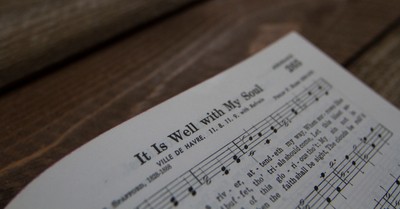Divinely Blinded: Lessons from the Road to Emmaus
- Judy Salisbury, Author of "The Conversation"
- Updated Mar 25, 2015

When reviewing the Emmaus account in Luke 24, many people seem to have the same nagging question. Why didn’t those two downcast disciples of Jesus (Yeshua) recognize Him immediately when He happened upon them? I imagine we could agree that immediate recognition surely would have saved them, at the very least, a two-hour trek all the way to Emmaus. After all, an early moment of recognition would probably have prompted the zealous proclamation, “Forget Emmaus, let’s head to the upper-room now!”
Perhaps some folks, reading the account for the first time, might surmise that it would have been more compassionate for Jesus to reveal His identity at the onset, especially because they were in such despair. Surely recognizing Him immediately would have moved them to a place of rejoicing. This is particularly true since it is exactly what happened when they finally did recognize Jesus; back to Jerusalem they sprinted to announce their experiences with the other disciples.
Indeed, Luke 24:16 states that, their eyes were prevented [or quite literally were being prevented] from recognizing Him. However, the question is, Why? Speculating as to why God does something supernatural always puts us on dangerous territory. I believe God pays close attention to how folks who purport to know something, share that something. However, at the same time, in our pursuit for truth, I also believe it’s healthy to share our thoughts on particular matters as long as we are careful to note that our theories remain in the realm of pure speculation. Therefore, allow me to speculate on the matter of the disciple’s particular type of Divine blindness.
No doubt, Cleopas and his traveling partner struggled to reconcile the events they witnessed with the identity of the One they loved and thought they had lost forever. They genuinely desired answers; some sort of context to explain their own personal, why? They had a picture in their minds. They knew what they saw, what they experienced, and this they tried to reconcile with their own presumptions regarding the coming Messiah. They exchanged meaningful, impassioned words, but until the Word Himself walked with them, their exchange only amounted to more confusion and despair. Especially, it seems, when they had to explain those painful events to that Unannounced Eavesdropper. There seems to be a bit of irony in their desperate search for truth, as Truth Himself walked beside them.
For me, there is something precious in the picture of Christ walking with us in our darkest hour, which I cannot overlook. So often, as fleshly humans, we desire an answer when His desire is that we have the answer—Himself. He knows what is required for us to reach that place of joy and peace in Him. What an example we have in the road to Emmaus account: where two or more are gathered, there He is in their midst.
When reasoning amongst ourselves concerning spiritual matters we don’t understand, there is always a high risk for heresy. Yet, the Word explains it all. Beginning with Moses, to the Prophets and the Psalms, we find Him: the Alpha the Omega, the Beginning and the End, the First and the Last. If you seek Him throughout His Word, the Lord God, will be found by you. What the natural eye cannot see, the Spirit will surely reveal. Here is what they could not see; that the Messiah must suffer and die before He could enter into His glory.
Though sorrow is for a night, there is joy in the morning, and those two downcast disciples needed to see and live that truth. Through their pain, they could not see that Jesus’suffering would translate into their eternal joy. I believe the Lord, in His grace and mercy, prevented them from recognizing Him so they would have the opportunity to see with real clarity. They needed to understand by way of His recounting of the Scriptures concerning Himself. Truly, had He immediately revealed Himself to them, it would have been obvious that He was risen indeed. However, it was imperative that they first see with their hearts and minds before recognizing Him with their natural eyes. Since our Lord’s desire is for us to share Him with others through His Word and not His physical body, that is what they needed to see first. They needed to see Yeshua, Jesus the Messiah, foretold throughout the Scriptures.
In John 20:29 Jesus said to Thomas, another chap who needed a bit of clarity, “Because you have seen Me, have you believed? Blessed are they who did not see, and yet believed.” It is the weaning of the child dependent upon the mother always being in clear, physical view. When the child learns to trust their mothers’ promised return, they feel free to play peacefully in another room. They know she is there even though they cannot see her. They trust she will respond when needed. They are content and lack nothing. They freely and joyfully go about their busy play. They trust without sight.
Perhaps those men needed to trust the Word, from Moses to the Prophets and the Psalms, before relying upon His physical presence for evidence to His identity, purpose, and glory. For soon, that was exactly what they would need to teach others to do, to trust Him by His Word not the manifesting of His body.
We, like the two disciples on the road to Emmaus, have sorrows, confusion, disillusionments, and despair. It is our lot as fallen individuals, living among other fallen individuals. Yet, 1 Peter 1:6-9 is a great passage to realize the depth and truth of Jesus’ words in John 20:29: In this you greatly rejoice, even though now for a little while, if necessary, you have been distressed by various trials, so that the proof of your faith, being more precious than gold which is perishable, even though tested by fire, may be found to result in praise and glory and honor at the revelation of Jesus Christ; and though you have not seen Him, you love Him, and though you do not see Him now, but believe in Him, you greatly rejoice with joy inexpressible and full of glory, obtaining as the outcome of your faith the salvation of your souls.
Some people need to “see” by way of proof and evidence. I thank God for divinely preventing those two downcast men from immediately seeing or recognizing Him, as it brought about a cementing of their faith and a radical transformation from sorrow to joy inexpressible and full of glory. And it is just that kind of transformation that turned the world upside down.
Judy Salisbury is an author, speaker, and founder of Logos Presentations. She is a certified lay counselor through the American Association of Christian Counselors, and serves on the board of directors for the International Society of Women in Apologetics (ISWA)as a trainer and an advisor. Her new book, The Conversation: An Intimate Journal of the Emmaus Encounter (Lederer/Messianic Jewish Publishers), fills in the blanks of the Luke 24 story. For more information, visit: www.logospresentations.com.




















